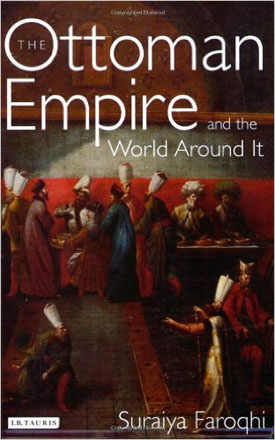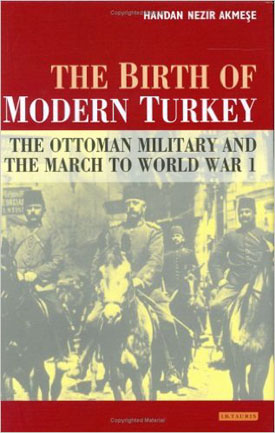The Ottoman Empire and its successor, modern Turkey, have time and again played an important role in European politics, and yet there are vanishingly few sources in English to bring us the viewpoint of the Turks themselves, or, indeed, to focus on the Anatolian peninsula as other than an adjunct to the doings of European states. Addressing that lack is one of the aims of two recent histories.
 Suraiya Faroqhi’s The Ottoman Empire and the World Around It is, in its author’s own words, a work of synthesis: an attempt to bring together a variety of sources in order to give a picture of the state of the Empire from the time it achieved stability as a political entity until it ceased to be an effective presence in the European theater. A reader without some grounding in the period — from roughly the mid-sixteenth through the late eighteenth centuries — particularly the history of the Middle East or that of Eastern Europe, is going to be lost.
Suraiya Faroqhi’s The Ottoman Empire and the World Around It is, in its author’s own words, a work of synthesis: an attempt to bring together a variety of sources in order to give a picture of the state of the Empire from the time it achieved stability as a political entity until it ceased to be an effective presence in the European theater. A reader without some grounding in the period — from roughly the mid-sixteenth through the late eighteenth centuries — particularly the history of the Middle East or that of Eastern Europe, is going to be lost.
Part of this is the paucity of sources: judging from Faroqhi’s comments, the Ottoman archives, what of them still remain, are fragmentary and quite often do not contain documents with any real information. For example, the pronouncements of the Sultan, his official missives, operate on the assumption that there was no higher authority and that anyone he communicated with must necessarily be a dependent. The communications of the viziers, on the other hand, often contained the real meat of any discussions, but, alas, they are for the most part no longer extant.
Another area that will present difficulties for the nonspecialist is simply the range of phenomena that Faroqhi draws into the discussion. It goes without saying that, to the contemporary historian (or anyone who pays attention to the news, for that matter), economics plays as large a role in world affairs as do politics or military strength or any other aspect of what we are pleased to call “society.” Nevertheless, linking all the strands that combine to make up “history” can be a daunting task if one is to maintain intelligibility. Faroqhi’s focus is necessarily broad, in terms of the operative factors in Ottoman politics, both internal and external, the latter in relation to a rapidly changing Europe on the one hand and a sometimes hostile and often restive Islamic world on the other.
Consequently, while there is a wealth of fascinating detail in Faroqhi’s account, one is hard put to find a structure, leading to a confusing and sometimes chaotic picture of developments in the Empire over the course of several centuries. Her seeming reluctance to establish a basic timeline that gives us the political events and nails down, for example, the increasing autonomy of Egypt and the rest of North Africa in relation to Ottoman relations with the Islamic world outside of the Empire, while it does provide the flexibility to range across several areas of activity, gives the reader no point of reference for establishing a sensible pattern. Although it seems that the focus on European relations is a necessary one, given that the Ottoman Empire was the dominant interface between Europe and the Islamic world for several centuries, it would also have been helpful if Faroqhi had found some means to expand on events to the east.
 Handan Nezir Akmeşe’s The Birth of Modern Turkey, on the other hand, is, as one might expect from a book that began its existence as a doctoral dissertation, a tightly focused on the role of the Ottoman military in the formation of the modern Turkish state.
Handan Nezir Akmeşe’s The Birth of Modern Turkey, on the other hand, is, as one might expect from a book that began its existence as a doctoral dissertation, a tightly focused on the role of the Ottoman military in the formation of the modern Turkish state.
Contrary to what we generally think of as the conservative nature of military establishments, the military in the Ottoman Empire of the later nineteenth and early twentieth centuries played a significant role in the modernization of Turkey and the dissemination of ideas about the ethnic basis of nationhood current in Europe during the period. It is from the German-trained officer corps that Turkey found her future political leaders, including Kemal Ataturk, and it was in their training under German officers that these men first came in contact with many of the ideas that led to the revolutionary movements in Turkey that eventually established a specifically Turkish secular Muslim state.
While Akmeşe’s book is insightful and often illuminating, the cut-off before World War I, while it does provide an appropriate end point from a scholarly point of view, leaves the general reader with a feeling of incompleteness: we’ve seen where the impulses came from and how they developed, but this reader, at least, would have felt more rewarded with a text that followed developments through to their conclusion in the establishment of the Republic of Turkey.
Together, these two books provide a picture of the history of Turkey from near the end of Ottoman expansion in the sixteenth century to the eve of the Empire’s dissolution in the early twentieth. It is a sometime fragmentary picture, but the emphasis on native sources and an Ottoman point of view is welcome. One can only hope that one of these authors, or perhaps both, will see fit to expand and clarify their work and bring us the overall history of the Ottomans that we need.
(I. B. Tauris & Co., 2004)
(I. B. Tauris & Co., 2005)
